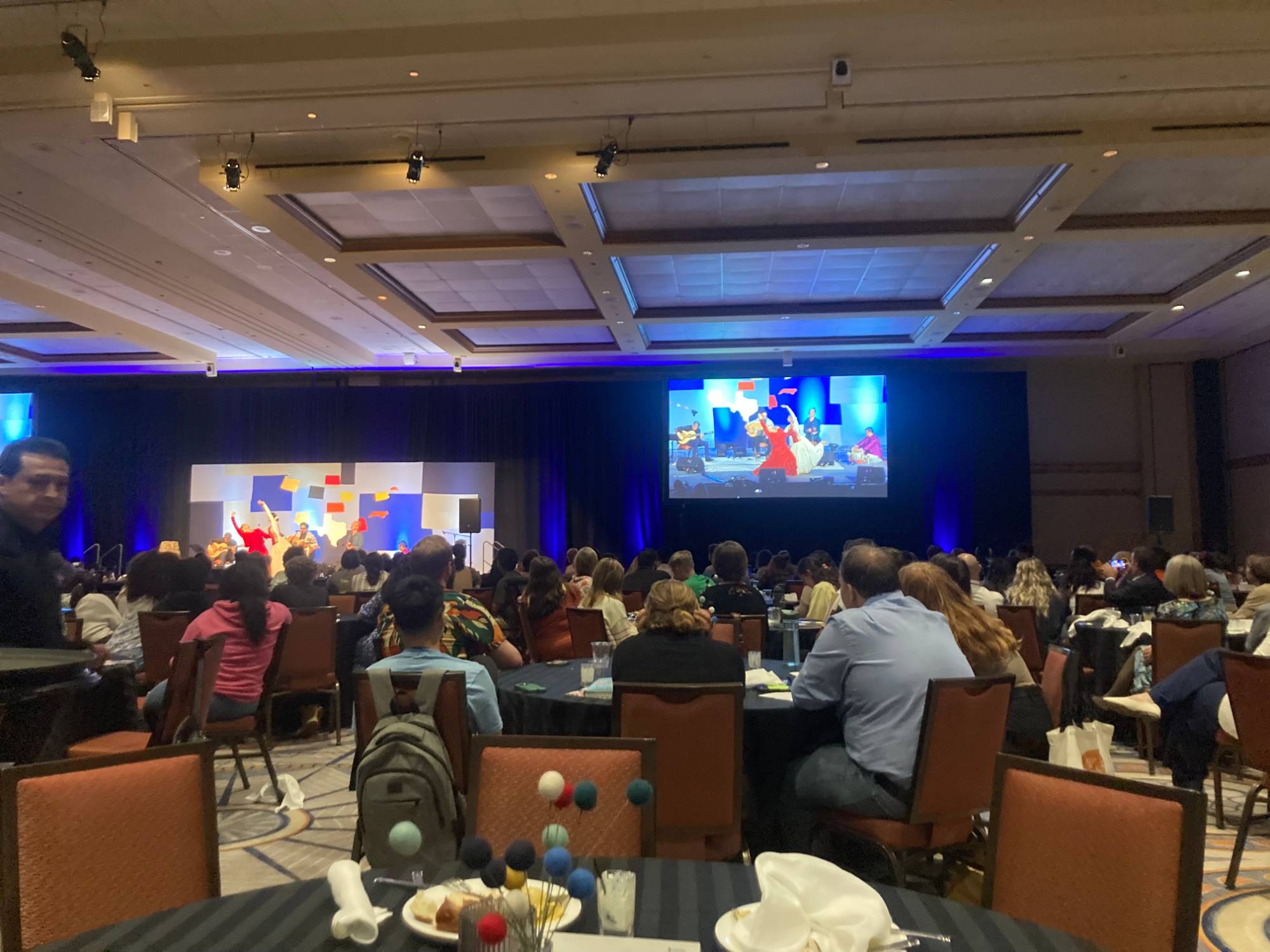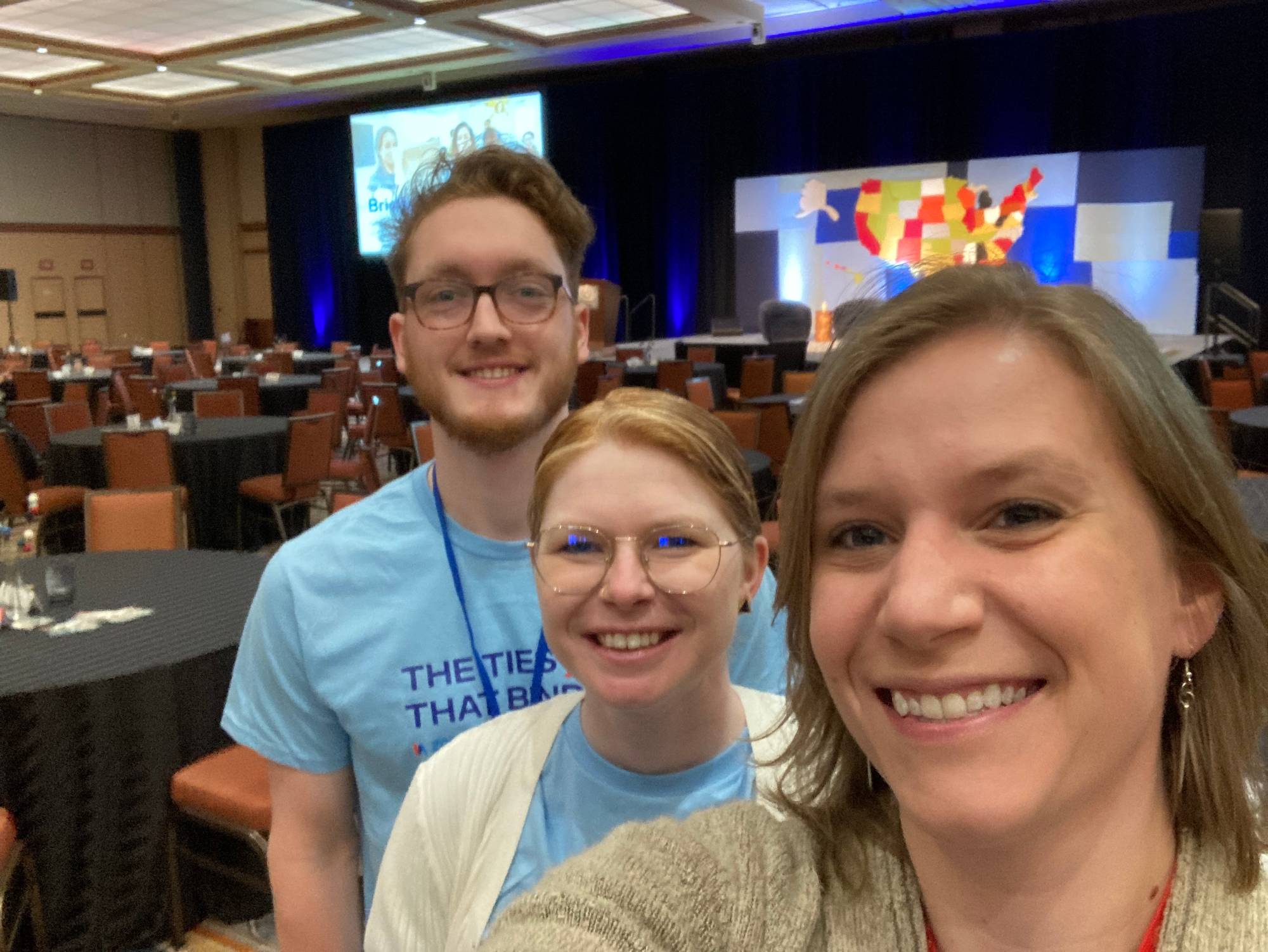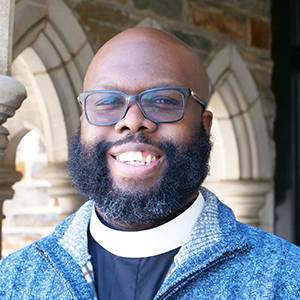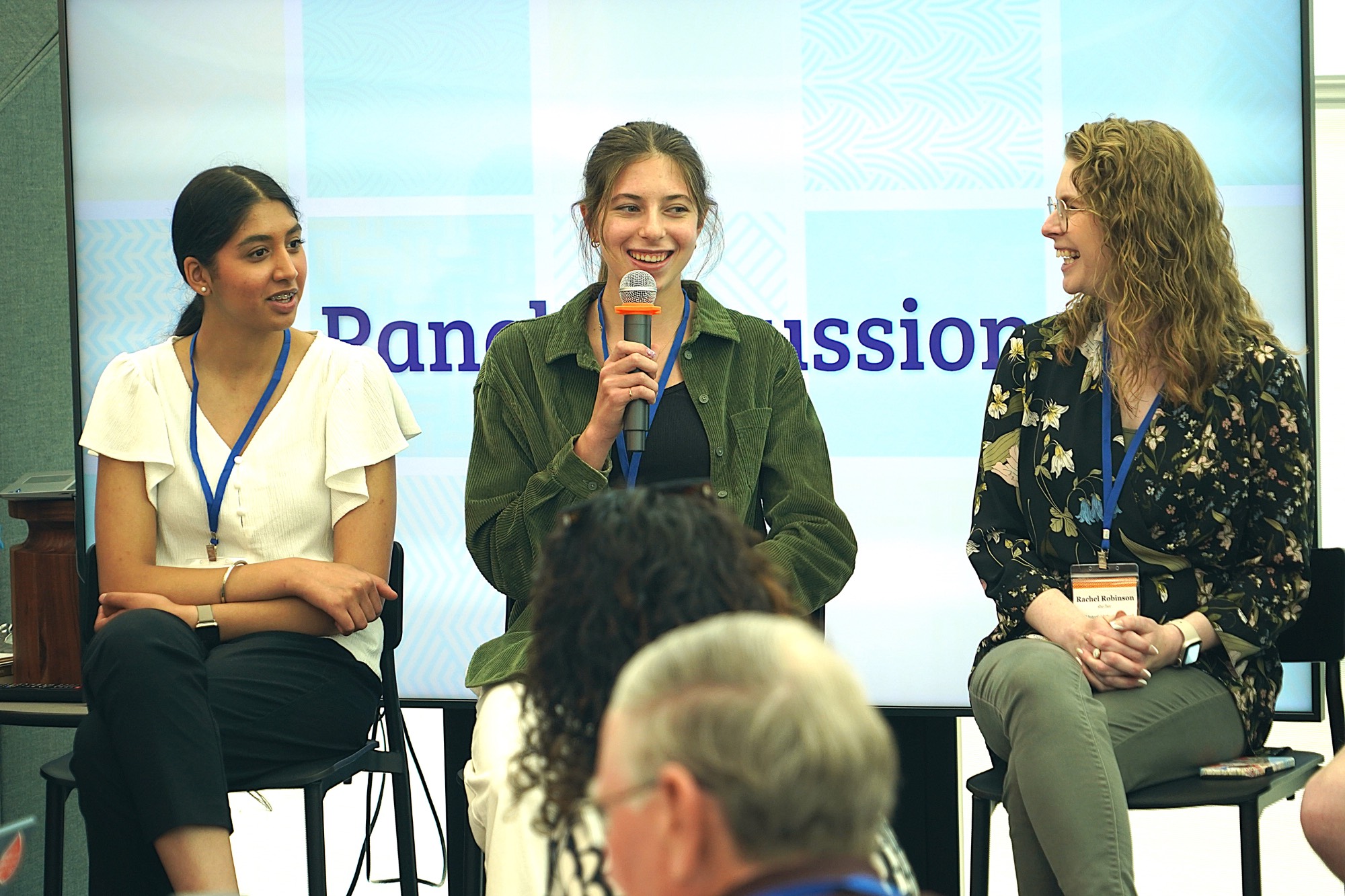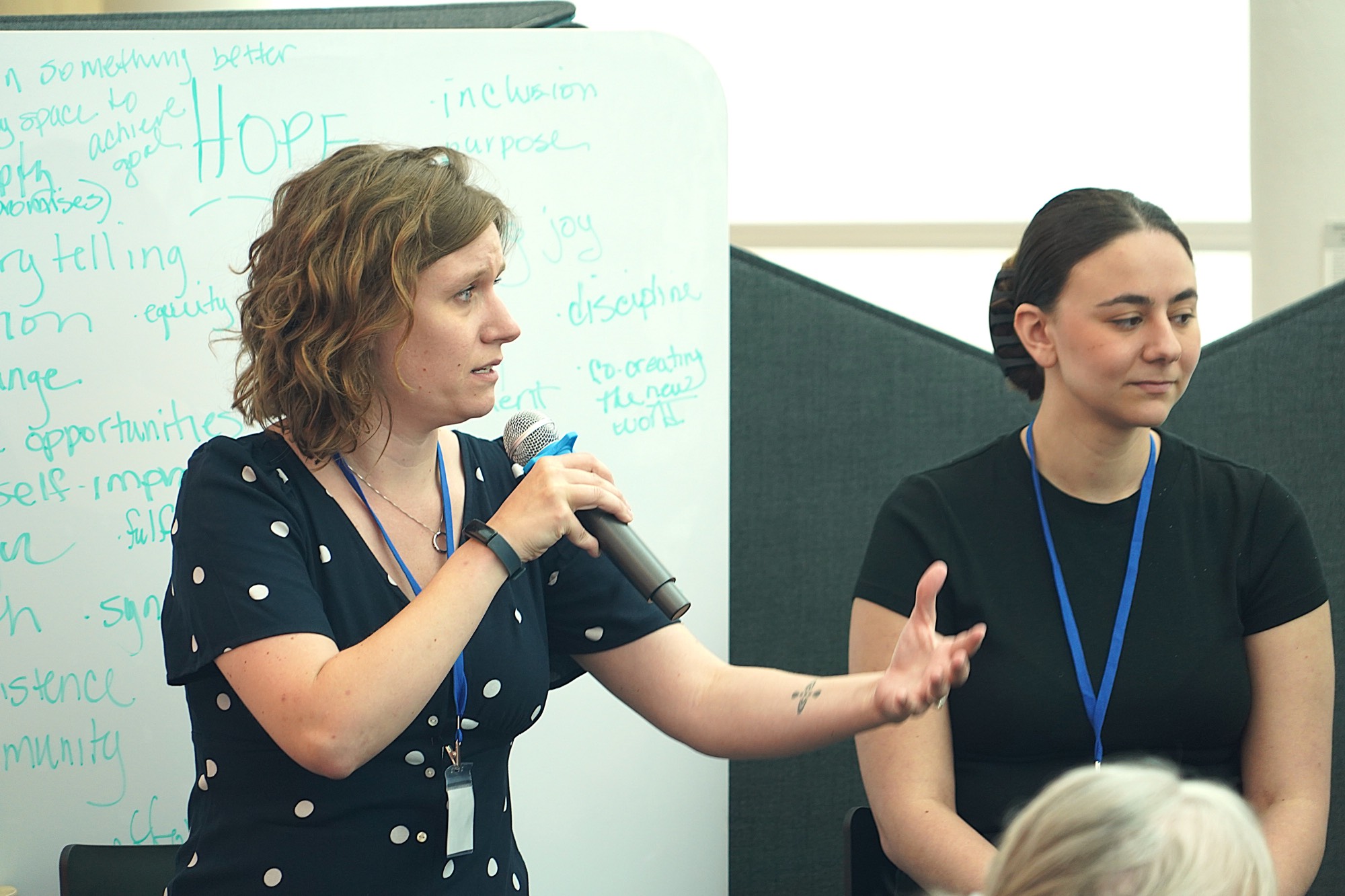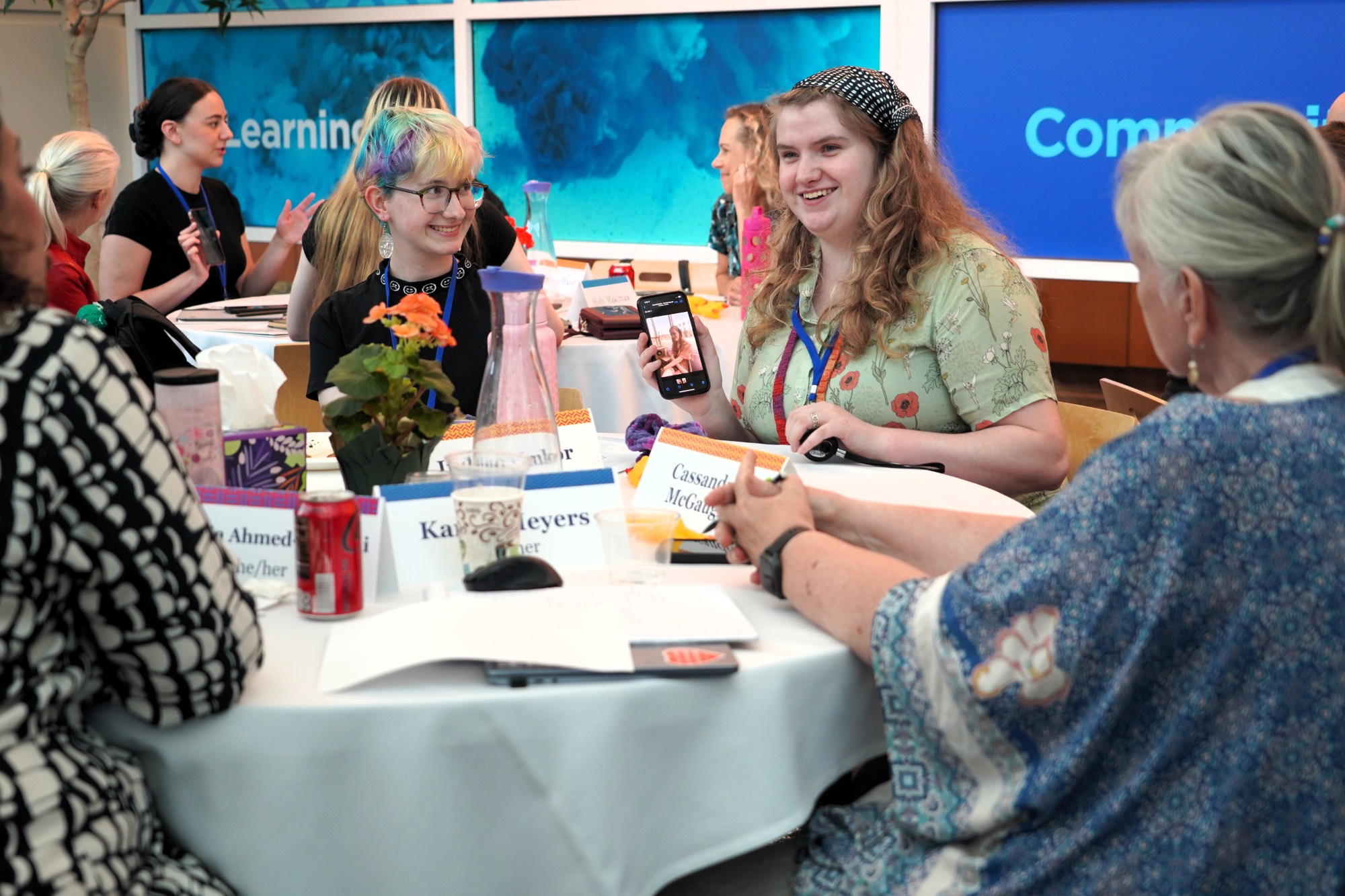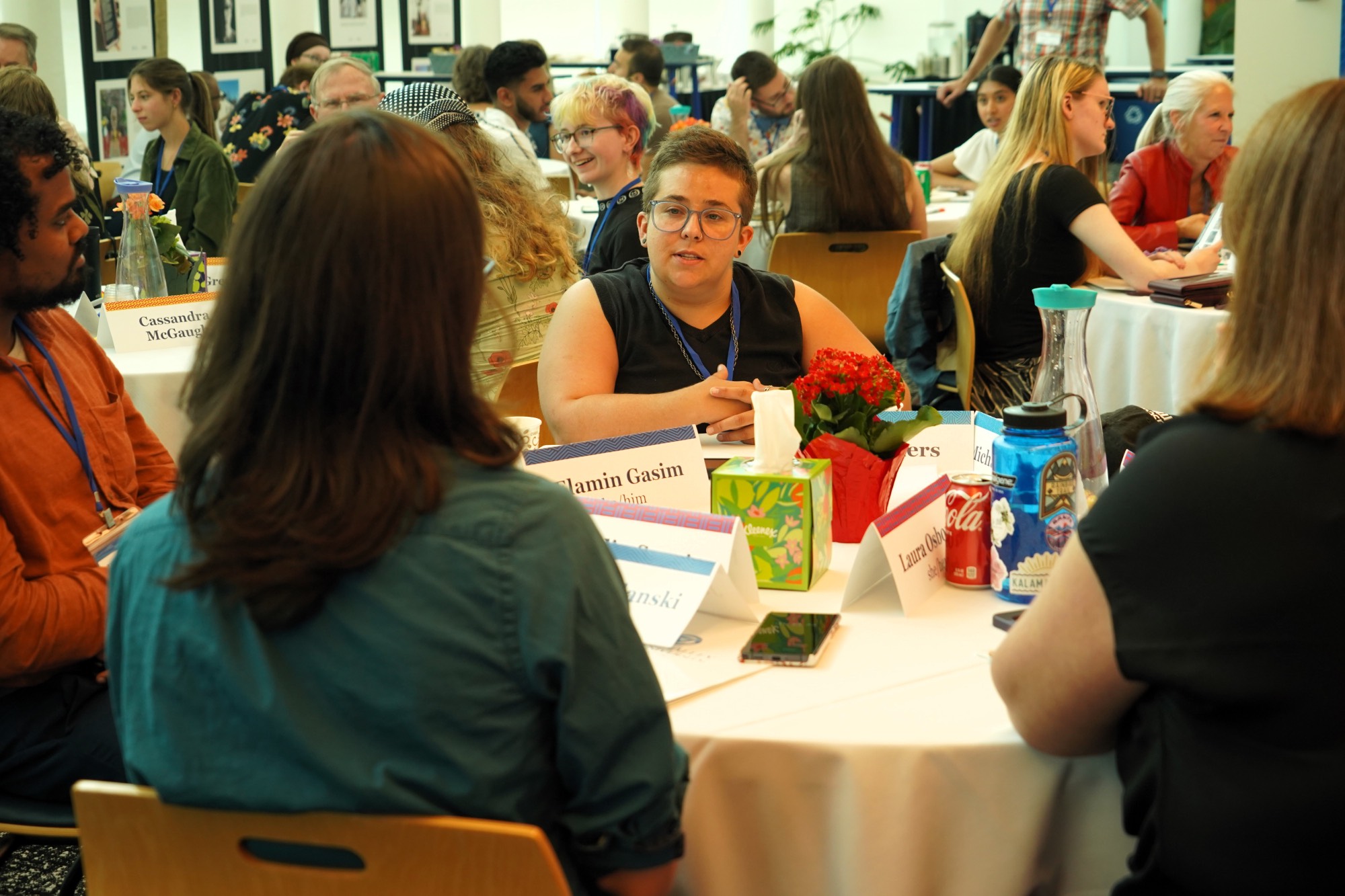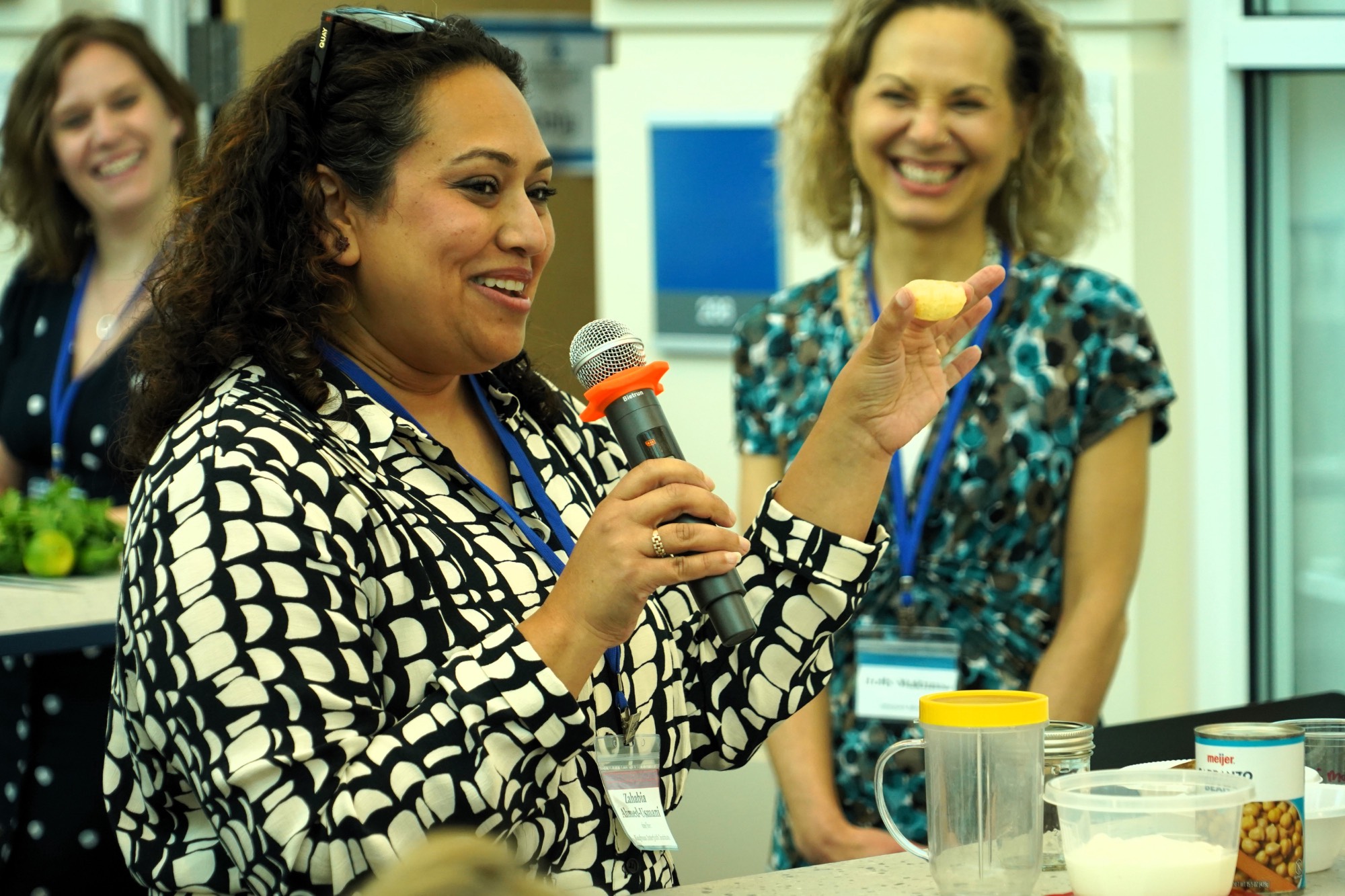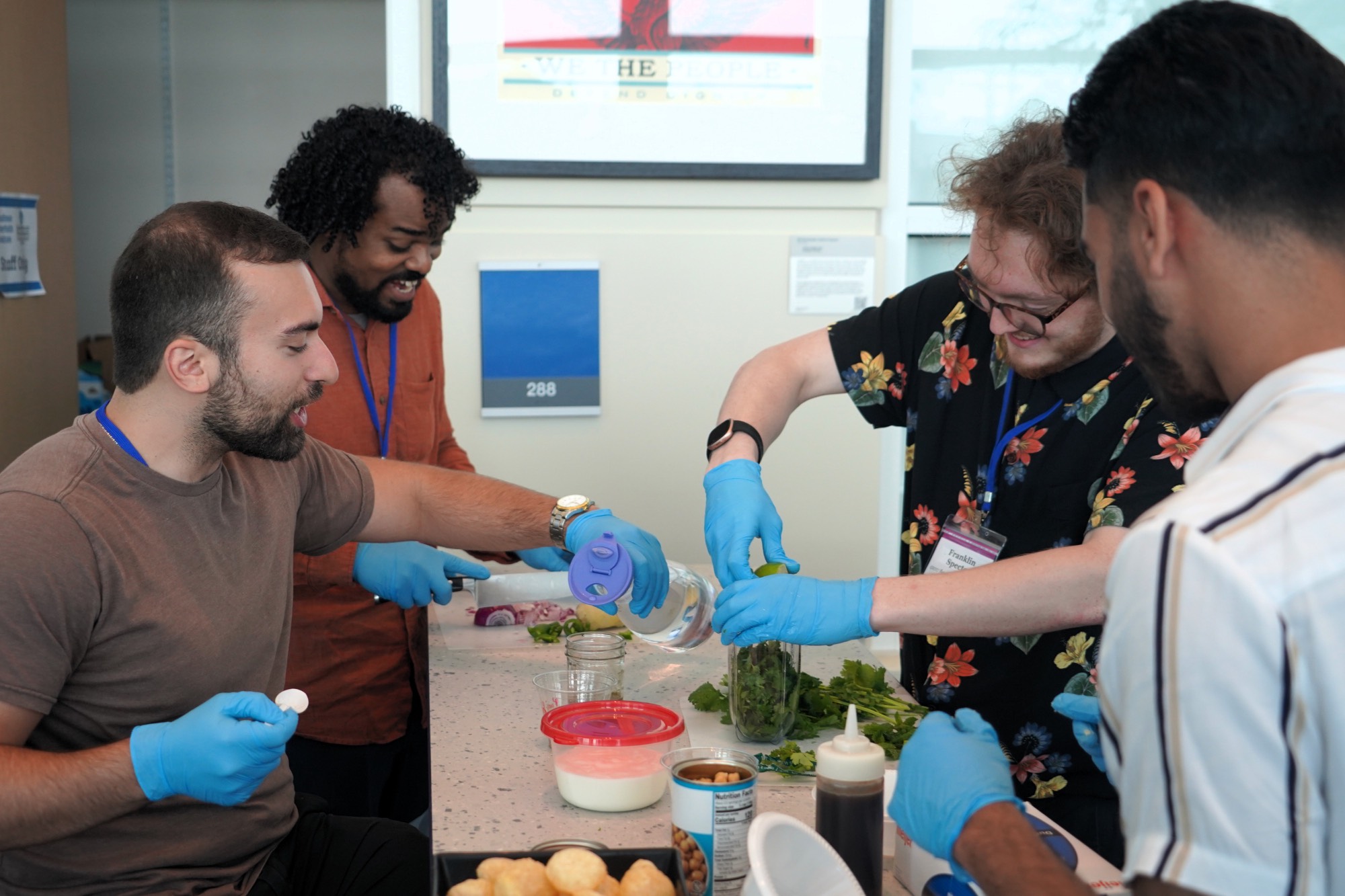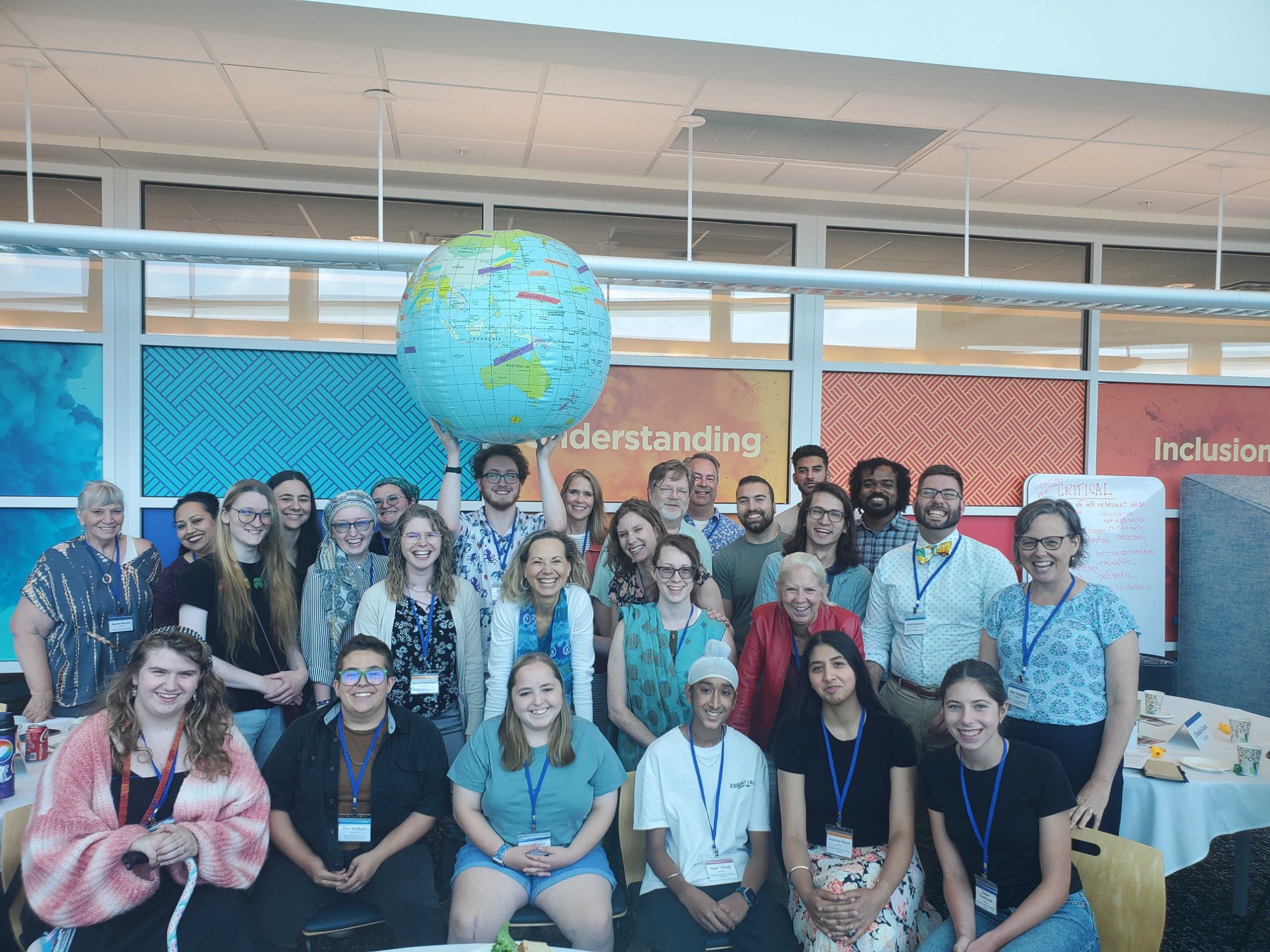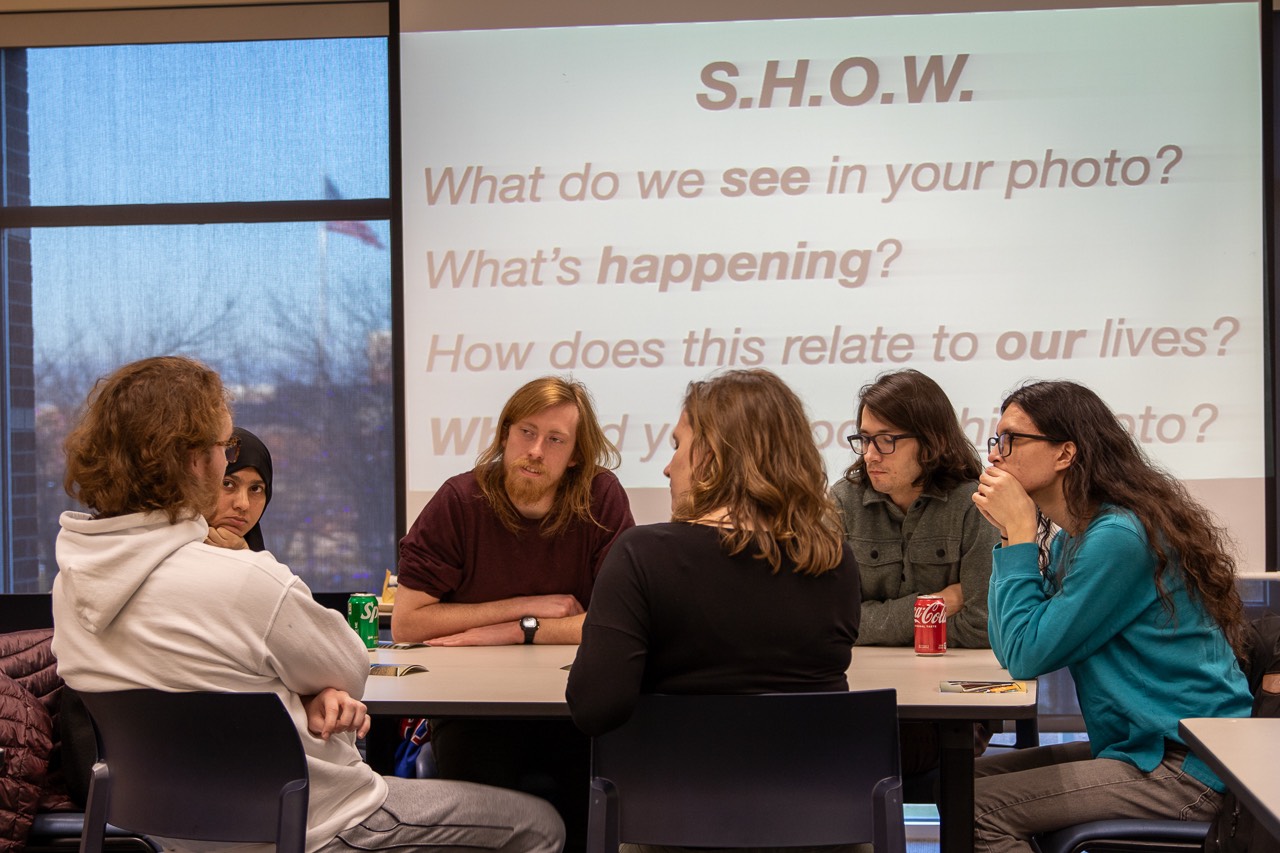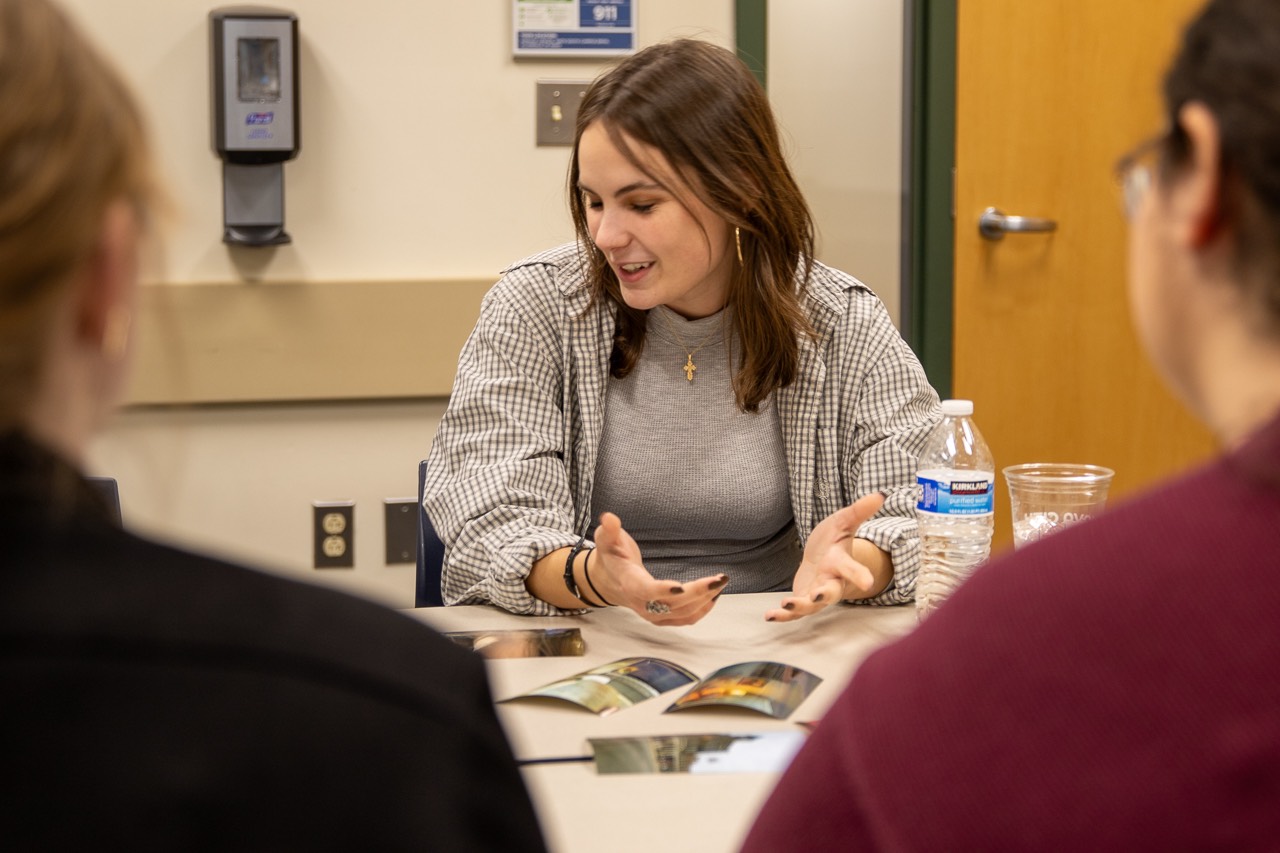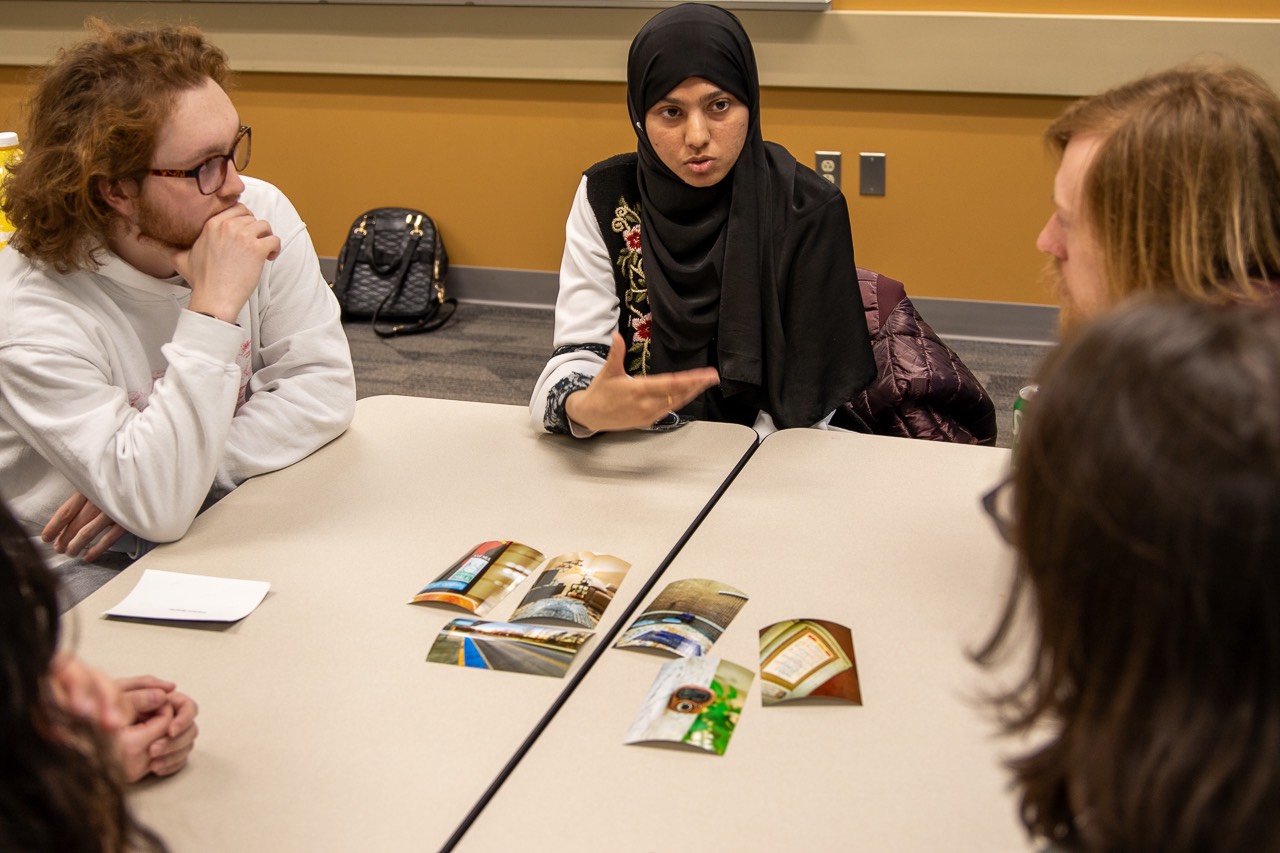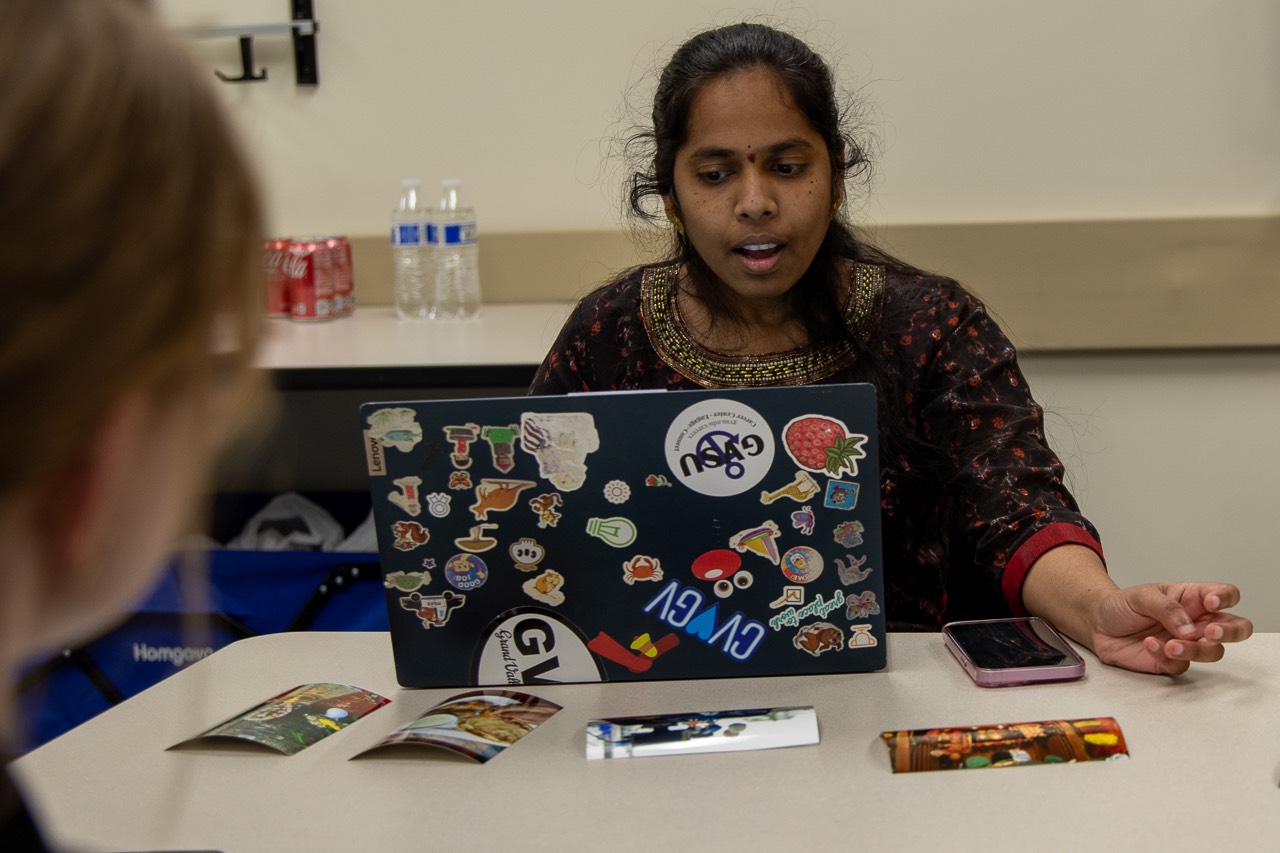Kaufman Updates
Permanent link for Engaging 'Thin Spaces' of Connection, Understanding, and Transformation | By Kyle Kooyers, Director of Operations on September 17, 2024
“No one lives outside the walls of this sacred place, existence.” -Rabia Al Basri, Arab Muslim Saint and Sufi Mystic
Growing up in the Christian Tradition, especially around the summer camp scene, we would often use the term “thin place” to describe spaces and contexts where there was a nearness to the sacred, a closeness to God. Originating with Celtic Pagan culture, the implication of this term is that the line, the veil, the distance between the physical and the ethereal or heaven and earth, was so very fine that one could almost exist in both places simultaneously, becoming attune to the presence and movement of the divine energy.
These “thin places” look different for each of us - especially as we orient differently around religious, secular or spiritual identities. Perhaps it’s engaging in a thoughtful and honest conversation, free from distraction, where we see or feel seen by those who we can no longer call a stranger. Perhaps it’s retuning to the rhythms and frequency of nature as we sit awestruck of our earth, floating as dust through the vastness of the Milky Way. Perhaps it’s feeling awash and alive with the emotional language of dance and song, moved by rhythms of our artists and ancestors. Or perhaps it’s the moment of breaking bread, where we share sustenance at a table with those whose daily dependence on food illumines the sacred reality of our shared mortality.
It’s not that these spaces or moments are in any way magical in and of themselves, though they may certainly feel as such. Rather, they interrupt us. They draw our attention to something that has been there all along. We are opened-up to the numinous, to the profound sense of presence and connection to something beyond us…even if that “sacredness” is simply our shared planet and inhabitance as a human species.
In her book, Sage Warrior, author and activist Valarie Kaur writes, “If we are all apart of the one, then there is no space that is not sacred. But it’s so hard to remember that when we are holding a toddler over a toilet. Or stuck in traffic. Or falling into our phones. It’s especially hard to remember in the wake of a mass shooting or climate disaster or atrocities happening in real time. We need to demarcate space in order to connect with the sacred…These are not spaces of escape; they are spaces of refuge where we can respond to what is happening from our deepest wisdom, our best selves.”
Kaur goes on to talk about the importance of finding that sacred sovereign space within us for energy and resilience. But here at the Kaufman Institute, we recognize that we also have that in each other. We must also do this work of demarcation, even in interfaith dialogue, so that we can connect to one another. That isn’t always easy. In an era of hybrid attendance and recordings made available after the fact, our presence is no longer required to participate and take in the content of a gathering. But what about the visceral feeling of the space, the human connection, the collective transformation? To paraphrase Gil Scott-Heron, the revolution will not be live-streamed.
Over the course of this past month, the Kaufman Institute has been working to nurture those demarcated spaces. At the end of August, we hosted our first in-person luncheon for Multi-faith Leaders since the start of the pandemic. These gatherings have been a rich time of connection and relationship building where we can share with each other the concerns, hopes, and emerging projects of our respective communities. Looking ahead, the Institute plans to revamp these spaces to better network and support area clergy and leaders as they are helping their communities navigating a very polarized and uncertain time.
Staying with the theme of ambiguity and anxiety, last week we held our Fall Interfaith Tuesday Table Talk, planned hosted in partnership with Dominican Center Marywood at Aquinas College. The theme, drawing from the wisdom of Howard Thurman, was “Centering Down in an Uncertain World.” It was profoundly appropriate that, on the night of the US Presidential debate, we gathered to talk about the ways we can look to our centers of belief, behavior, and belonging to sustain ourselves in seasons and times that are profoundly disorienting and unpredictable. We shared with one another the anxieties we are holding as well as the ways in which we can choose to respond with thoughtfulness, centered in compassion, rather than giving in to the seeming normalcy of vitriol.
At both of these gatherings, the rooms were warm and transcendent as we had space to pause and simply listen to one another. They were disruptive in the most beautiful and edifying sense. Franciscan friar and teacher, Richard Rohr, offers this observation:
“[We] often remain trapped in what we call normalcy— 'the way things are.' Life then revolves around problem-solving, fixing, explaining, and taking sides with winners and losers. It can be a pretty circular and even nonsensical existence. To get out of this repetitive cycle, we have to allow ourselves to be drawn into sacred space, into liminality. All transformation takes place here...This is the sacred space where the old world is able to fall apart, and a bigger world is revealed.”
There is a very palpable opening-up that we have found within these in-person spaces, where we invest in the intimate. Free from the tyranny of the camera or recording, free from the trappings of an impressive headcount that renders us invisible to the crowd, we can share a profoundly authentic human experience with one another. Yes, we will still offer our larger events, and we will strive to make those events accessible to folks who, for one reason or another, are unable to join us in-person. But there is something to be said for being together, for engaging in thick dialogue in thin spaces – for drawing each other’s attention to the abiding presence of something that is much larger than any of us and yet, at the same time, requires all of us. This is where connection, understanding, and transformation take place.
Permanent link for Lessons of Humility and Hope from Interfaith America | By Liz English on August 20, 2024
Earlier in August, I had the opportunity to attend the Interfaith America Leadership Summit with two of my GVSU students volunteers. The theme of this year's Summit was The Ties That Bind, and we asked the question, in a time when our social fabric is being stretched thin, how can we come together to create positive engagement and reconnect? The three-day conference in Chicago was geared toward both educators and students actively engaged in interfaith work on their respective campuses across the country.
As a part of the opening plenary, we heard from Shira Hoffer, a senior at Harvard and a changemaker in the pursuit of interfaith understanding on her campus. In response to the October 7th attacks, Shira created the Hotline for Israel/Palestine, an educational initiative meant to provide a multi-partisan approach to the conflict with an emphasis on creating your own nuanced and informed perspective. From there, she went on to found the Institute for Multipartisan Education to continue to encourage curiosity as a tool for engaging across difference.
In her opening remarks, among her many pearls of wisdom, she left us with this very poignant and frank advice: “If you ever feel as ‘unexpert’ as me, it doesn’t mean you can’t still do something.”
Over the last two years in this job, there have been any number of times where the word ‘unexpert’ would have come in handy. Navigating the crisis in the Middle East is just one recent example. Securing musical instruments for visiting international bands was another. Developing engaging campus programming is an ongoing experience filled with questions like - Do I really know what I’m doing? Who am I to say? I’m no expert!
Thankfully, an integral part of the Summit is connecting with others who are also sailing uncharted waters and yes, sometimes making it up as they go. All levels of experience were present. Workshops included folks from Big 10 universities who brought 30 staff and students to the conference and also the single representative from the private school with less than 1500 people. Together, we were able to share our experiences, our wisdom, occasionally our resources, our successes, and, importantly, our missteps. We could name the challenge of this work honestly - the landscape for this work changes every day, and we must adapt to succeed. That means finding yourself in new and unfamiliar territory quite often as a program manager. We aren’t going to get it right every time. We cannot possibly be experts in everything that this diverse work requires of us. What we can do, though, is keep learning and keep trying, and it is so much easier to do so in community.
Shira’s comment provided a moment of vulnerability, honesty, and humility. And critically for those of us who may be worn down or burned out, her insight instilled within us a drive to keep going no matter what, because this work is truly that important.
As we enter into a new school year, we are trying new things once again, inventing and reinventing in community. On campus this year, Kaufman is creating spaces devoted to simply being human together, playing games, and sharing a meal (like our Multifaith Mixer), as well as those where we’ll dig deep to explore difficult conversations (such as our Faith Over Division conversation). I am perhaps most excited about the development of the Interfaith Student Council (IFSC) at GVSU, with a board of four fantastic students from across worldview traditions devoted to creating campus culture that values diversity, promotes understanding, and inspires collective action for positive change.
Rachel and Franklin, both of whom are on the board of the newly-minted IFSC, joined me at the Summit, and left with perhaps even more enthusiasm than they came with (which is saying something!). The energy with which they engaged in the three-day conference did wonders for my own excitement for the upcoming year. I cannot wait to see what they come up with for ways of engaging their fellow students. While we all will likely feel ‘unexpert’ from time to time, especially as we adapt and try new things, we will be sure to pause and celebrate what we have accomplished. Sure, that could mean a sell-out crowd at one of our large events, or more likely, in such relational work, it could mean a handful of heartfelt and open conversations, or a collaboration with a new university partner, or coffee and connection with a new friend. Or perhaps it looks like bringing two students to the Summit where my first year I attended alone. :)
Permanent link for Interfaith and Democracy: Finding Healing Through Conversation | By Kyle Kooyers on August 19, 2024
As I reflect on the intersection of interfaith work and democracy, I am reminded of Stephen Colbert’s observations on the night of the 2016 U.S. Presidential Election. While doing The Late Show and simultaneously watching the results come in, he noted the Pew research which showed how more than half of the Democrats (55%) say the Republican Party makes them afraid, while 49% of Republicans say the same about the Democratic Party.
“So, how did our politics get so poisonous?” he asked. “Maybe we overdosed,” he suggested. “We drank too much of the poison…You take a little bit of it so you can hate the other side. And it tastes kind of good. And you like how it feels. And there is a gentle high to the condemnation. And you know you are right.”
As we navigate this current election season, we are acutely aware that our country and communities, have become increasingly polarized. As we find ourselves entrenched in survival-based tribalism and echo chambers, our propensity to develop and vehemently protect in-group identities galvanizes our resistance to moving towards those with whom we disagree. These “us/them” categories, fueled by anxiety and defensiveness, color the lenses through which we view and even demonize our neighbor.
If multi-faith dialogue has taught us anything, it’s that all too often we allow ourselves to be afraid of people who are different, even hate them, because there is a “gentle high” we find in condemning, especially in our desire to “win,” or to be right. The consequences of this are very real, especially when it comes to negative or even violent interactions between individuals or groups of people who see the world differently. So, to help confront and heal toxic polarization and division on GVSU’s campus and in our West Michigan community, the Kaufman Institute is focusing on the intersections of interfaith work and democracy over the course of this coming academic year.
First and foremost, we are excited to be partnering once again with the Padnos/Sarosik Center for Civil Discourse, the Hauenstein Center for Presidential Studies, and WGVU Public Media for a second year of Talking Together: Strengthening Our Communities Through Conversation. As with the previous Talking Together year, the primary objective is to interrupt toxic polarization and foster instead a culture of conversation on campus and in local communities. This program line-up, with a focus on, deep listening and story-telling from a multiplicity of perspectives, will be bookended by two powerful programs.
One Small Step, an initiative of StoryCorps, is an effort to remind the country of the humanity in all of us, even those with whom we disagree. The initiative brings strangers with different political views together to record a 50-minute conversation—not to debate politics, but to learn who we are as people. Audio recordings of each interview are archived at the Library of Congress. We are currently recruiting conversations participants, so if this sounds intriguing you can sign up here: https://www.wgvu.org/onesmallstep/
Michigan Listens, part of the America Listens project of Boise State University, will bring to together a wide range of people for an evening of storytelling and listening over dinner. On April 2, 2025, this event will pull together everyday people from across our state –farmers, restaurant workers, business leaders, veterans, students, etc. to speak about what they value and why to an audience that remains silent. Occurring after the presidential election, this gathering will offer a path for healing the relationships that have been strained or fractured by the campaign season’s corrosive rhetoric.
As a supplemental component, of the Talking Together initiative, on September 24, we are bringing One America Movement’s nationwide Faith Over Division Tour to Grand Rapids. This event, in the spirit of inspiration and healing, will bring together people of faith to find hope and a shared future in the midst of toxic divisiveness. This conversation will explore how we can lean in to our respective religious, secular, and spiritual values as we seek to heal toxic polarization through relationship and understanding. This event will highlight the wisdom and experience of Rev. Randy Kyle Callender in conversation with One America Movement and Kaufman Interfaith Institute.
Our Interfaith Book Group will begin on Wednesday, September 11, featuring The False White Gospel: Rejecting Christian Nationalism, Reclaiming True Faith and Refounding Democracy by Jim Wallis . This is not just about Christian extremes but about all faith traditions and the danger of extremes. Along with this theme, later this December our Triennial Jewish-Christian-Muslim Dialogue will include Mustafa Akyol, Elaine Pagels, and Donniel Hartman in conversation about religion, power, and morality.
We are also pleased to announce that the Kaufman Interfaith Institute will be welcoming Sikh author and activist Valarie Kaur back to Grand Rapids as a part of the 2024-2025 Revolutionary Love Bus Tour. This healing odyssey across the U.S. offers an immersive experience of storytelling, music, song, ancestral wisdom, and community-building. Each stop uplifts local leaders, artists, and advocates who catalyze hope, equipping participants with the tools needed to lead with love and courage in our daily life.
Now more than ever, the Kaufman Institute, is committed to creating spaces for human connection - to learn about one another, to learn what we each other believes or hold to be true, and to learn how those views, principles, or ideas impact our everyday lives. True dialogue, like any relationship or journey is nuanced and complex, challenging and deeply rewarding. It doesn’t mean that I must agree with or accept your perspective as true for me, nor does it assume my perspective or experience ought to be true for you. Rather, it welcomes us into a place of respectful inquisitiveness and empathy. In this way we really begin to experience the beauty, complexity, and humanity of one another. That’s how we win. That’s how we strengthen our communities through conversation. Join us!
Permanent link for Michigan Interfaith Convening: Critical Hope - Envisioning the Future of Interfaith on June 25, 2024
As a capstone, last week's final convening in our collaboration with the Fetzer Institute drew upon the collective wisdom gathered and the self-reflection encouraged during this series to identify emerging characteristics and best practices for interfaith initiatives. Through a lens of belonging, aware of both our past and present, our goal was to explore interfaith spaces that move people towards a pluralistic future.Specifically, we examined the concept of Critical Hope as we looked to the future of the interfaith movement.
The term ‘critical’ has numerous implications, all of which are relevant to our project. The first is the sense of importance - critical as vital or essential. Secondly, critical implies a sense of urgency or immediacy. Lastly, to be critical means to be discerning or analytical. In theoretical contexts, critical thinking implies an explicit exploration of power, oppression, privilege, and the status quo.
Hope looks to a collective vision of a better future. It is what guides and sustains us in the incremental journey on the arc of history that bends towards justice. Hope is more than passive optimism or the naive expectation that change will happen overnight. Hope is an active pursuit of a reality not yet realized. Hope is the essential starting point and ever-present companion to justice-seeking work as it grapples with politics, emotions, relationships, lived-realities, and identities.
Critical hope invites us to hold conflicting truths in a single space and time, to sit in tension with differences, and to sustain a complex and shared pluralistic vision of a better world. Such change must be rooted in and arise from collective reimagining. This form of hope is brave and challenging and necessary. To engage in interfaith work is to engage in critical hope.
Last week, we gathered with 35 individuals from 15 different organizations from across the state to engage with this important topic. Over the course of our time together, we examined and lived into “critical hope” as a lens for interfaith. We stretched ourselves to see what is so often unseen - the dominant narratives that can unconsciously color and shape the spaces we create; we questioned our tried-and-true interfaith methods; and we spent time ‘taste testing’ different Kaufman programs that center relationships and that highlight voices that are often underrepresented in traditional interfaith spaces. Throughout the process, we caught glimpses of the work we have yet to do, but all the while, we held on to the essential dimension of hope and pushed each other forward.
As Ijeoma Oluo, author of So You Want to Talk About Race, notes, “No matter what our intentions, everything we say and do in the pursuit of justice will one day be outdated, ineffective, and yes, probably wrong. This is the way progress works. What we do now is important and helpful so long as what we do is what is needed now.” With that in mind, while our June gathering was the capstone for this collaboration, we recognize that the evolution of the interfaith movement will be ongoing. We are eager to stay connected and grow the relationships formed with our partner organizations as we support and encourage each other in this critical work of hope.
We are so incredibly grateful for the enthusiasm, the vulnerability, and the support of the individuals and organizations who attended, and for Rev. Holly Makimaa, Roman Williams, Rishi Singh, and the entire Kaufman staff for stepping in to co-facilitate such an impactful gathering. Lastly, we are incredibly grateful for the gracious support and partnership of the Fetzer Institute in underwriting this collaborative project.
--
Participating Orgs:
- Kaufman Interfaith Leadership Scholars
- GVSU Interfaith Student Council
- Michigan Organization on Adolescent Health (MOASH) MY Faith Council
- West Michigan Hindu Temple
- Greater Lansing Interfaith Clergy Association
- Momentum Center Holland
- Interfaith Photovoice
- Religious Society of Friends - Ujima Meeting
- Reformed Church in America
- C3: West Michigan’s Inclusive Spiritual Connection
- Northern Michigan Interfaith Common Ground
- Grand Rapids Baha’i Community
- Interfaith Leadership Council of Metropolitan Detroit
- University of Michigan
- Arab Community Center for Economic and Social Services (ACCESS)
Permanent link for Exploring Language for Pluralism and Human Flourishing on April 22, 2024
Last week, the Kaufman Interfaith Institute brought together 21 leaders representing 14 different interfaith initiatives and organizations from across the state of Michigan for a convening at our office at Grand Valley State University. Building on the theme of human belonging, this convening was a deep dive into our language and vernacular for engaging in the work of interfaith and pluralism.
Our purpose for this convening was to identify the barriers and opportunities of language as we work towards as shared and effective vernacular for the future of the interfaith movement. The terms we use carry with them distinct connotations, denotations, and biases that all play a part in enhancing or inhibiting spaces of belonging. We recognized that we all come to the table with different levels of experience and engagement, and as such, our April conversation was intentionally foundational, a step back to explore the words and phrases we use to create hospitable interfaith space and upon which relationships are formed.
To that end, we once again had the opportunity to build new connections and relationships with each other and between our respective organizations. We were able to share and learn about the work that each of us is engaged in to bridge divides, address disparities, and work towards individual or community transformation.
Over the course of our time together, we explored coded language versus language that liberates, we leaned into the complex work of creating brave spaces of belonging where disagreement is expected, we held space for listening and laughter as we shared about our respective work and resonance with terms and labels like “interfaith”, “multi-faith,” ”secular,” and “nones,” we spent time with our "Believing and Belonging" Photovoice Exhibit, and we mapped out list of words that harm, require context, and welcome to guide our work going forward.
We are so grateful to all of the organizations and individuals who responded to our invitation, to Rev. Holly Makimaa for facilitating our time together, to Desiraé Simmons, co-director of Interfaith Council for Peace and Justice, for her wisdom and thoughtful workshop on Belonging and Language, and to the Fetzer Institute for underwriting this collaborative effort! For those who don’t know, the Fetzer Institute helps to build the spiritual foundation for a loving world. They aim to inspire and serve a global movement that transforms the world into a more loving home for all.
Participating Orgs:
- Adhwaq Center for Spirituality, Culture, and the Arts
- Arab Community Center for Economic and Social Services
- C3: West Michigan’s Inclusive Spiritual Connection
- Evenstar’s Chalice and Institute / Interfaith Center for Spiritual Growth
- Fetzer Institute
- Greater Lansing Interfaith Clergy Association
- Holy Spirit Episcopal Church
- Interfaith Leadership Council for Peace and Justice
- Interfaith Photovoice
- Kaufman Interfaith Institute
- My Oasis Center
- Northern Michigan Interfaith Common Grounds
- One America Movement
- West Michigan Hindu Temple
- University of Michigan
This was the second of three convenings in Grand Rapids MI. We are excited to see where these new relationships might lead, to share out the research and learning from this gathering, and to continue the conversation at our final convening Critical Hope: Envisioning the Future of Interfaith on June 20-21, 2024. Stay tuned!
Posted by Kyle Kooyers on Permanent link for Exploring Language for Pluralism and Human Flourishing on April 22, 2024.
Permanent link for Building Communities of Belonging Across the State of Michigan on March 5, 2024
In late February, the Kaufman Interfaith Institute brought together 27 leaders representing 18 different interfaith initiatives and organizations from across the state of Michigan for a convening at our beautiful office in downtown Grand Rapids. This small gathering of Interfaith leaders was a fruitful time of listening, learning, and storytelling within the frame of pursuing anti-racism and communities of belonging.
We delighted in the opportunity to build new connections and relationships with each other and between our respective organizations. While each of our organizations are unique to the communities in which we operate and the missions we seek to advance, we were able to share and learn about the work that each of us is engaged in to bridge divides, address disparities, and work towards individual or community transformation.
Our purpose for this convening was to examine and determine where we are going in the context of where we have been as it relates to inclusion. Together, we explored how we orient around concepts like belonging and connection both in the context of community and as they relate to our ancestral roots. Historical and contemporary barriers have alienated and excluded predominantly BIPOC spiritualities from Interfaith space. Through a workshop led by Dr. Khadijah Matin, of One Spirit Learning Alliance, we began to examine the interfaith movement and our own individual biases through the lens of cultural humility, uncovering the internal work necessary to shift the interfaith movement towards anti-racism.
Over the course of our time together, we explored the connection we have to both generations of the past and generations of the future, we leaned into the messiness around labels, generalizations, and stereotypes, we held space for listening and laughter as we shared about our respective work and journeys, and we mapped out what resources exist or need to be developed to support this work going forward.
We are so grateful to all of the organizations and individuals who responded to our invitation, to Rev. Holly Makimaa for facilitating our time together, to Dr. Khadijah Matin for her wisdom and engaging workshop on cultural humility, and to the Fetzer Institute for underwriting this collaborative effort! For those who don’t know, the Fetzer Institute helps to build the spiritual foundation for a loving world. They aim to inspire and serve a global movement that transforms the world into a more loving home for all.
Participating Orgs:
- Arab Community Center for Economic and Social Services
- Baha’i Community of Grand Rapids
- Fetzer Institute
- Holy Spirit Episcopal Church
- Interfaith Leadership Council of Metropolitan Detroit
- Interfaith Photovoice
- Interfaith Round Table of Washtenaw County
- International Campus Ministry at Western Michigan University
- Kaufman Interfaith Institute
- Mars Hill Bible Church
- Michigan Interfaith Power & Light
- My Oasis Center
- Momentum Center/Extended Grace
- Northern Michigan Interfaith Common Grounds
- One Spirit Learning Alliance
- Reformed Church in America – Interreligious Relations
- United Campus Christian Fellowship
- University of Michigan
We are excited to see where these new relationships might lead, to share out the research and learning from this gathering, and to continue the conversation at our April Convening: Exploring Language for Pluralism and Human Flourishing. Stay tuned!
Posted by Kyle Kooyers on Permanent link for Building Communities of Belonging Across the State of Michigan on March 5, 2024.
Permanent link for Check In: Interfaith Photovoice On Campus on February 27, 2024
The semester is flying by, and amazingly enough, we are already halfway through our Interfaith Photovoice cohort! Despite the busyness of the season, our Kaufman Campus Intern team was able to take a moment to reflect on their experiences so far.
---
Franklin: Having just finished my second meeting (third for the other members - I missed the first), I’m finding myself changing my mindset surrounding the event. College has been able to break me out of a black-and-white approach to parts of my life, and Photovoice is a continuation of this trend. I’m seeing how much more dynamic both my self and the people around me are through this experience - it is very refreshing. I am looking forward to future meetings and what they reveal to me.
Molly: Photovoice has been a really amazing experience for me. I’ve gotten to hear from so many different perspectives on campus. The biggest thing Photovoice has taught me is that everyone has their own story. I am so excited to see how the exhibit turns out and for more people to hear everyone’s stories.
Cecelia: More and more I am realizing the value of programs like Photovoice, specifically the creation of an intentional space where people, young people like college students can feel safe and be brave to share their experiences and stories of their lives while perusing higher ed. In our last meeting, I was touched and heartbroken by the shared experiences of feeling disconnected. It made me thankful to have things like Photovoice in place, that give us avenues to connect through photos.
Liz: I am thrilled with how this cohort is coming together. These fantastic students continue to enter into this space with their eyes and ears wide open, delving deeply into what can be vulnerable conversations and learning how to ask good questions of each other. Already natural themes are beginning to emerge from the discussions - as are key distinctions in both the approach to the weekly prompts and the experiences of the group. I am so grateful to be in the room and to be learning from, with, and about these wonderful humans!
---
This cohort will culminate in April with a pop-up exhibition of photos curated by the group. This exhibition will travel to a few locations before finding its home in the Kaufman programming space on the GVSU Health Campus. We hope you will join us for any and all of these events! We encourage members of both our GV community and the greater West Michigan area to come and hear their stories and see through their eyes.
To begin, the photos will be on display all day April 11th in the lobby of the Kirkhof Center on the Allendale Campus. The following evening, they will be highlighted at the President's Reach Higher Showcase on April 12th from 4pm-7pm which will be on the Downtown Pew Campus. The Showcase is free and open to the public with dinner and drinks provided. Registration is required for the April 12th event . It will also be a fantastic opportunity to learn about other innovative and cutting-edge work taking place at GVSU.
Posted by Liz English on Permanent link for Check In: Interfaith Photovoice On Campus on February 27, 2024.
Permanent link for New Year with No Dreams, by Cecelia Olson, Kaufman Campus Intern on January 22, 2024
Dreams are overrated.
I understand that sounds a bit bleak, especially with this new year and our collective societal obsessions with goals and new beginnings. But recently I have learned I am not a dreamer. Plain and simple. When I tell this to people they seem a bit confused and then there is a following response along the lines of “well don’t say that”. I appreciate the etiquette but I am actually very content with not having big dreams or deeply specific goals for my life. Again, bleak.
One of my dear friends is a chronic dreamer. Everyday he wakes up
with a mentality that he can be or do whatever he wants with his day,
his life. This is how most of us wake up I imagine, with at least a
little bit of autonomy and hope but probably a larger chunk of
responsibility than he had. Regardless, most of us might take this
autonomy and freedom to dream to the extent that we can change up our
morning routine, maybe wear jeans to work instead of slacks – screw
it, even get fast food for dinner.
My friend dreamt he could wake up and be a cowboy in Montana, climb
his way up to the top of a corporate ladder, go into carpentry, be an
inventor of the next big
revolutionary piece of furniture, join
the military, move to Alaska or Hawaii, be an expert sailor. Perhaps
his biggest dream was traveling the world and getting to come back
home to a perfect little house on top of a hill.
I recently heard someone else say they feel like their dreams are
obligations to accomplish, some type of self achievement checklist
that allows them to believe they
have lived a life that was
meaningful and purposeful.
I wonder if it was the weight of all these dreams that made him feel a bit trapped in his life.
For myself, with the exception of perhaps having a beautiful clawfoot bathtub one day, there are not many things I actively desire and deeply want for my life. At least not in the same respect as my friend. I don’t have dreams. No big bucket list I am anxious about completing. My dreamlessness was made very clear after many conversations and secretive comparisons between myself and my friend. See, it’s not that I don’t have any ambition or motivation for my life. However I am not convinced I am the one who propels most of what happens within it. They say the Christian life is one of intense cooperation with God, but it is impossible to reach out and join hands with God when they are tightly clinging to our self created dreams and expectations. The wonderful Henri Nouwen, a Catholic priest and writer, puts it a bit more succinctly in his work Turn my Mourning into Dancing where he writes:
“When we stop grasping our lives, we can finally be given more than we could ever grab for ourselves”.
It was a bit confusing to find this quote that so clearly articulates what I have slowly been realizing in a book revolving around embracing and struggling with grief, but I think now it makes sense. When I asked my dreamer friend if he had any New Year’s resolutions, he shrugged and said, “oh, just the same ones I write down every year.”
How many of us are grasping so tightly onto wild dreams and old resolutions just so we can avoid the grief of reality when our lives might not look the way we want them to? Aren’t we all a bit desperate to avoid the reality that we actually have much less control over our lives, and especially over other people’s lives, than we think we do?
If you’ve read some of my previous blog posts, you’ll know I am a
practicing Eastern Orthodox Christian. Personally, I am a big believer
in God’s will. No, not the pop culture definitions that use God’s will
as a scapegoat or the one where I think that whatever I do in my life
doesn’t matter, none of that. I believe in the Will where I am
invited to intensely cooperate with God.
I believe God’s Will is to love my neighbor and my enemy. My only responsibility is to build and embrace a heart where this love can live itself out. How exactly that looks is not for me to dream up. When I look back at the past year I see that my life has been full of more maturity, friendships, struggle, forgiveness, endurance, accomplishments, learning, direction, and joy than I could have ever dreamt for myself. I trust God with my desire to have a fulfilling and loving life, and I trust Him to figure out the details of how it all plays out.
Perhaps my friend gripped his dreams so tightly because he didn’t
have a trustworthy place to set them down, a place where there are no
crushing expectations or the lie that we can earn love and purpose and
worth. I find all this is Christ. See, I don’t have any real desire
for dreams because I’ve learned I’m not in
control, or even
possession of my life anyways.
My life was given to me to be given to others.
I am by no means a saint and fail at this countless times, but I do my best to give away my life –that is my effort, thought, heart, hope, friendship, service, talents– to whatever and whoever has been given to me. We grasp things desperately - stability, hope, dreams - when we are afraid of what will happen when we let go. Perhaps we think we’ll be letting go of purpose, success, fame, confidence, predictability, hope, or even love. Of course we cling to dreams. But like Nouwen alluded to, when we come to life, when I come to God, with open hands, an open heart, and the intention of giving what was given we can receive much more than what we clung to in the first place.
With all integrity I do not mean this post as a guilt trip. I admire deeply how much hope my dreamer friend could cultivate within his life and use it to inspire others. By all means, go travel the world, be a cowboy in Montana, create that piece of furniture, please get to that lovely house on top of the hill, write down the same old resolutions. But I hope you aren’t clinging to those things thinking they will help you avoid the grief of reality and the unknown. Embrace everything that happens and everything that didn’t but, don’t get stuck there. I’ll end with a quote from an Orthodox Christian saint, St.Gregory Nazianzen:
“Do not let your troubles distress you too much. For the less we grieve over things, the less grievous they are.”
Cheers to a New Year full of gratitude and embracement and courage, a year of relief instead of grief!
Cecelia Olson
Permanent link for Welcome Back, Lakers! Kaufman in 2024 on January 9, 2024
And we're back!
Admittedly it was quite difficult to put the book down, clamber out of the oversized reading chair, change out the pjs, and leave the kittens behind at home, but that fantastic season of rest did wonders to prepare me for an exciting semester ahead! Here's a quick glance at what we've got coming up on campus:
We're hitting the ground running by participating in Campus Life Night this Friday evening from 6-8pm in Kirkhof. Stop by our table to hear a bit more about our plans for this semester (and beyond!), learn about the resources we provide, grab some snacks, or try your hand at Celebrity Worldview Trivia!
Speaking of plans, have you heard about our Interfaith Photovoice cohort? Starting in February, we'll be bringing together a group of students with diverse religious/spiritual/secular identities to dig deeper into their GV campus experience. This weekly cohort will use mobile phone photography to help capture and share those stories and will culminate in a public exhibition of the photos. This is a paid focus group, and we're still looking for more participants, so if this sounds like something you'd be interested in, or if you'd like to learn more, please reach out!
We'll also be hosting another session of our What Is Interfaith? interactive workshop later on this month as an introduction to interfaith engagement, especially how cultivating a mindset of cultural humility can lead to a more welcoming campus for everyone. Come learn the basics, pick up some tips and tricks for dialoging across difference, and meet other students interested in the work, as well! We hope to see you there.
And that's just January! We'll have more events, conversations, and other ways to engage throughout the semester, so keep an eye out for more soon!
Liz English, Kaufman Program Coordinator
Posted on Permanent link for Welcome Back, Lakers! Kaufman in 2024 on January 9, 2024.
Permanent link for Reflection and Hope: Kaufman On Campus on December 19, 2023
This past semester, we've been hard at work developing programming, gathering together, and defining our collective voice on campus. We asked each other a couple questions as we look back and look forward into the year ahead. Here are the team's responses:
What do you feel like we've accomplished on campus so far this year?
Molly: Something we did this year was create a space for people to openly talk about their spiritual identity. Through events like interfaith 101 and the Teach-In, we allow people to explore more about themselves self even if it was just for an hour or two.
Cecelia: This past semester has shown me that effort and presence are everything. It can be easy to be discouraged in this type of work, but throughout the semester I have been comforted and found purpose in thinking about what campus would look like if we, and interfaith resource, we’re not here. So this past semester I’ve found there is need and purpose in this work.
Franklin: We’ve accomplished further cementing Kaufman as a campus entity. Seeing the team and my peers all acting on campus makes Kaufman feel more alive and a part of GVSU. We’re going on strong to be a well-oiled, operating machine!
Liz: I hold fast to Rev. Jennifer Bailey's quote that "relationships are built at the speed of trust, and social change happens at the speed of relationships.” We've spent the first half of this school year showing up, being present and reliably available, while getting to know each other as a small but mighty team. I'm very proud of the foundation of trust we've formed within our group.
Zahabia: Reinvigorating presence on campus, clarification of what interfaith resources we have for campus, building connections with all aspects of student life and promoting spiritual wellness on campus, and bringing faith based organizations together on campus.
Kyle: Looking back over this past year, I'm incredibly proud of the strong foundation we have built for offering and sustaining support and resources for students of all worldview identities and traditions. Updated strategic language, goals, and values, a fresh brand layout, a revamped websites, a vivid and compeling new look to the Interfaith Inform e-newsletter help us articulate and showcase the impact of our work and make it easier for students to connect with us, with our programming, and with one another. Likewise, the immense effort to network across the university - Recreation Wellness, Social Justice Centers, Student Ombuds, Counseling Center, University Library, Art Gallery, School of Health Science, Religious Studies, Inclusion & Equity Institute - as well as, strengthen connections with university leadership have set us up to have a wide network of partners and a broad reach with out programming. Lastly, I'm thrilled for the return of our Interfaith Campus Intern program, as we are benefiting greatly from the leadership and vision of three exceptional students this academic year. All of this enabled us to provide a high level of support and direction to the University at a time when hate and division on college campuses has reached a boiling point and will continue to serve us well as we continue the work of fostering the next generation of pluralistic citizens and compassionate neighbors.
What are you looking forward to next semester, or beyond?
Molly: Looking forward, I would love to reach more people on campus. I want people to know what Kaufman is and all the amazing things we are trying to do at GVSU.
Cecelia: I am looking forward to cultivating relationship and community with students not totally on the basis of spiritual identity, but in aim that we can build relationships as full people and they can know any type of spiritually or lack there of has a safe space to be shared or talked about within that relationship and community on campus.
Franklin: Next semester, I am looking forward to seeing how our activity on campus grows as Photovoice takes place. I think the group will really help get Kaufman in the minds of others and create spaces for good conversation.
Liz: Cannot wait for the campus cohort of Interfaith Photovoice to get underway! I'm excited to dive in, to see and hear the stories and experiences of other students on campus.
Zahabia: Photovoice and more intimate conversations with students about issues of religious/spiritual/secular identities on campus. A deeper awareness of Kaufman- who we are, what we do, how we can resource the GV community. Also, hoping we can gain more insight on what the campus needs/wants and that we have that trust with others to work alongside of us on this work.
Kyle : I'm really excited about our upcoming Interfaith Photovoice initiative on campus, both for the amazing relationships that are built through sharing food and storytelling with pictures as well as the ability for us to hear directly from students about their experiences on campus as persons of diverse religious, secular, and spiritual identities. That process of deep and engaged listening with allow students themselves to drive the programs, initiatives, and resources that the Kaufman Interfaith Institute offers to the GVSU campus. As seen with our community councils and planning committees, the Institute is at it's best when it is empowering and supporting grass-roots movements and projects. I'm thrilled to see a similar, yet creative, approach being taken to develop a well resourced community of belonging at Grand Valley.
Doug: The Kaufman team is playing a more important role on campus and we are grateful for the support from students, faculty, staff, and university leadership. These are times when understanding among faith communities is even more important than ever. We continue to find the commonality within difference as we affirm our basic humanity.
Posted on Permanent link for Reflection and Hope: Kaufman On Campus on December 19, 2023.


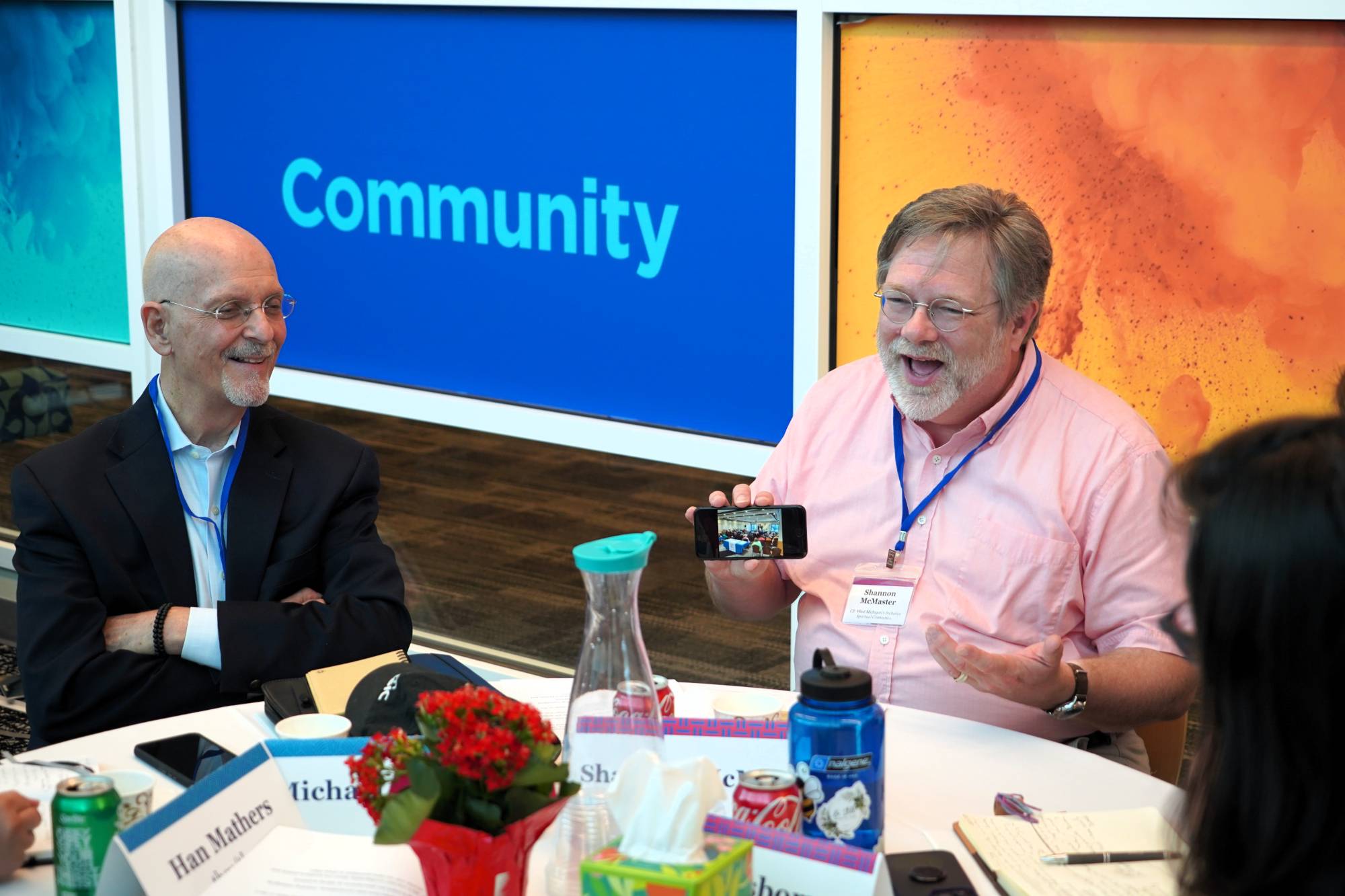
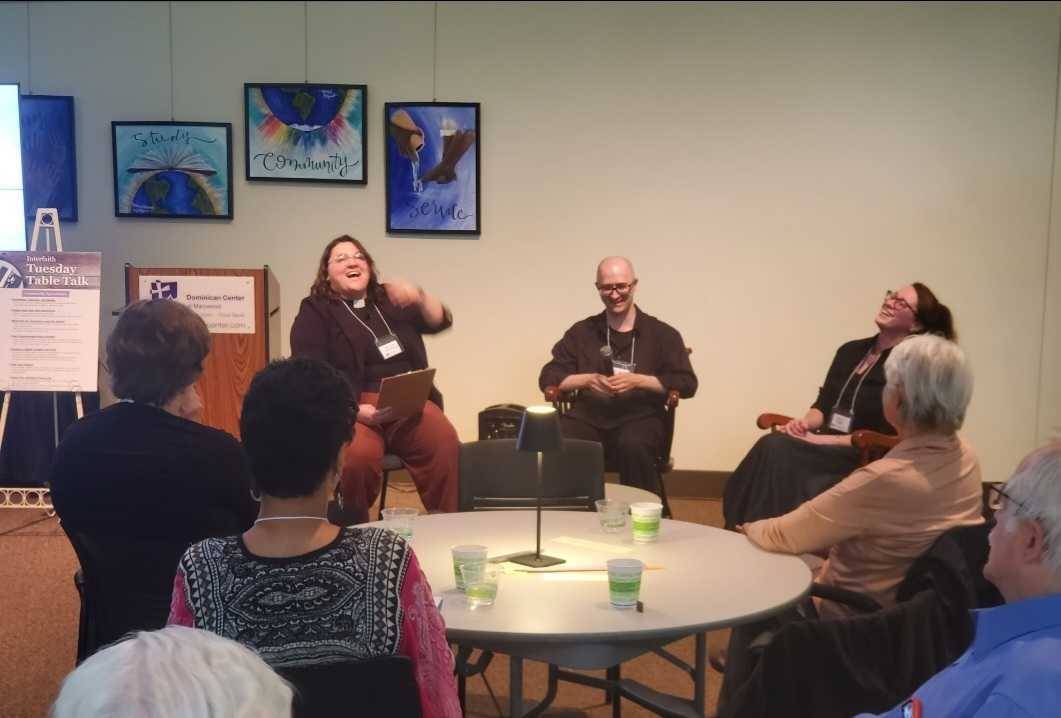
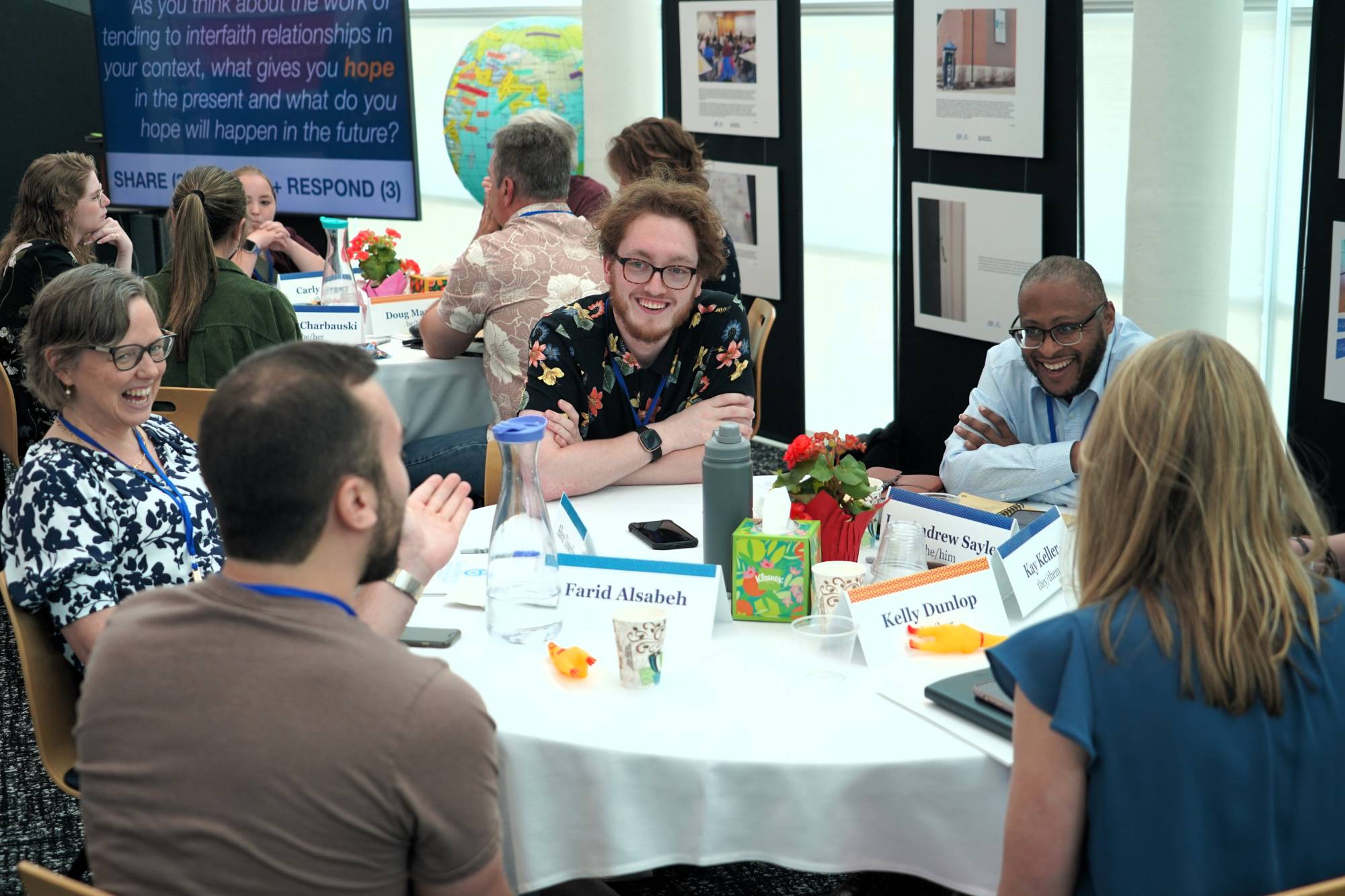
[1726585837].jpg)



